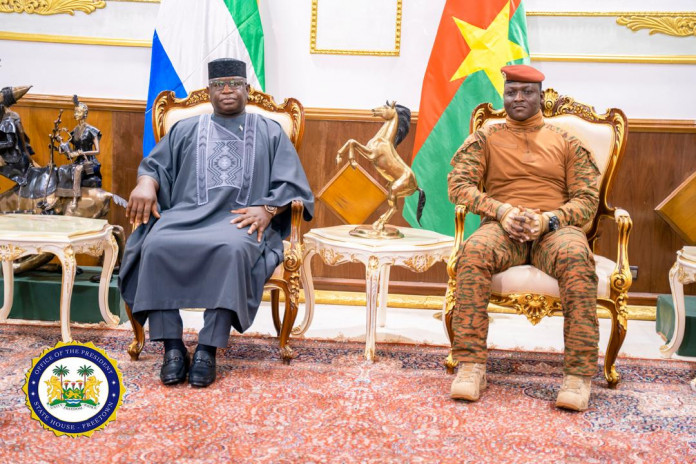By Esther Wright
The Ministry of Information and Civic Education held a special Press Conference to discuss significant moments from the State Opening of Parliament by President Dr. Julius Maada Bio on Tuesday, August 6, 2024. This historic event marked the commencement of the Second Session of the Sixth Parliament and was characterized by a notable display of unity and bipartisan cooperation. Key Government officials and prominent figures provided updates on various national initiatives and reflected on President Bio’s leadership and the progress made under his administration.
The Minister of Information and Civic Education, Chernor Bah, praised the display of democracy in Parliament, highlighting the bipartisan interaction during the session. “SLPP and APC displayed unity and national cohesion amidst mild banter across the aisle,” he said. “This remarkable show of democracy underscores the importance of working together despite our differences. We are all one people in Sierra Leone, and it is crucial for us to continue living in harmony.”
Presidential Spokesman, Alhaji Dr. Alpha Kanu, acknowledged the comradeship in Parliament and attributed it to President Bio’s leadership. “This is the first time Parliament from both sides congratulated the President for a wonderful speech delivered,” he emphasized. “It’s a historic moment of unity and decorum, reflecting the leadership of President Bio and the commitment of our Parliamentarians to national progress.”
On the topic of Feed Salone, Alhaji Dr. Alpha Kanu updated the public on the initiative’s progress. “This year, about 30,000 hectares of rice have been cultivated in Tomabum, Samu, Lokomasama and Mambolo combined,” he announced. “This significant achievement in our agricultural sector demonstrates our commitment to enhancing food security and supporting local farmers,” he concluded.
The Leader of Government Business in Parliament, Hon. Mathew Nyuma, reiterated President Bio’s call for free media and the responsible use of social media to promote the country’s image. He referenced the Repeal of Part 5 of the Public Order Act, which has provided journalists with a free environment to practice their profession. “The repeal of part 5 of the Public Order Act gives journalists a free environment to practice,” Hon. Nyuma highlighted. “No journalist is in jail for doing their job. This is a testament to our dedication to upholding press freedom and ensuring a transparent and accountable Government,” he said.
Hon. Mathew Nyuma also emphasized President Bio’s strides in promoting women’s empowerment, noting how it enriches the tapestry of the country’s democracy. “President Bio’s strides in promoting women’s empowerment enrich the tapestry of our democracy,” he stated. “By advancing gender inclusion, we are not only fostering equality but also strengthening the overall fabric of our society,” he added. He also discussed peace and national elections, pointing out President Bio’s emphasis on dialogue to address electoral challenges and highlighted the drop in inflation and massive improvements in the health sector.
Leader of the Opposition in Parliament, Hon. Abdul Kargbo, informed the public about the constitutional requirement for the State Opening of Parliament to report on the President’s achievements over the past year and outline plans for the following year. “Parliament’s responsibility is to monitor MDAs in implementing the President’s vision,” Hon. Abdul Kargbo stressed. “Our role as the opposition is to hold the Government accountable and responsible. We applaud President Bio’s leadership in achieving milestones such as MCC and the UN Security Council seat, as well as attracting IMF and World Bank support,” he said.
Hon. Abdul Kargbo also described protests as citizens’ democratic right, not a crime. “Protest is a citizens’ democratic right, not a crime,” he stated. “We must condemn faceless protests and urge citizens to follow due process. The Government should promote unity through actions, not just words, to truly reflect the democratic values we uphold,” he emphasized.
Educationist Fatu Taqi commended the impressive nature of the event, especially the unity among Members of Parliament. “President Bio’s speech was ‘accommodative,'” she remarked. “The GEWE Act and political will to advance gender inclusion are commendable. It is essential for MPs to publicly display their comradeship and prioritize the people’s needs, as they are the custodians of power. This unity and commitment to gender inclusion enrich our nation’s democratic process,” she concluded.
The State Opening of Parliament by President Dr. Julius Maada Bio was a significant event that highlighted the strides made in various sectors of the country. From promoting unity and democracy to advancing gender inclusion and agricultural progress, the session underscored the collective efforts towards national development. The Ministry of Information and Civic Education’s Press Conference effectively captured the importance of the event, reflecting the ongoing commitment to progress and unity in Sierra Leone.










